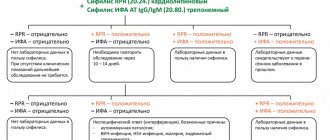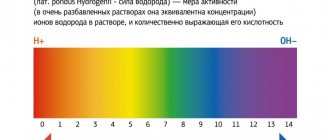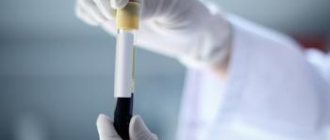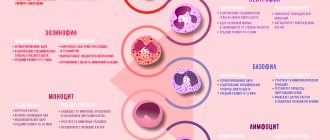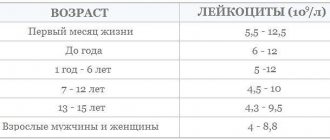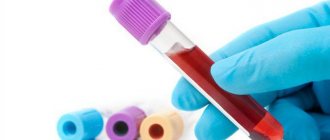Blood analysis
testing the concentration
of the hormone TSH
is a mandatory part of a comprehensive examination, which is prescribed by a doctor if a patient is suspected of having thyroid disease.
A blood test for the hormone TSH is the most important study in endocrinology. Click to make an appointment, ultrasound or tests
DETAILED DESCRIPTION OF BLOOD TEST FOR TSH HORMONE
If the level of thyroid-stimulating hormone is outside the normal range (decrease or increase), which will be shown in the results of the study, it will allow the specialist to confirm the presumptive diagnosis or make one.
General information about TSH
The content of the article
Thyroid-stimulating hormone is produced by a small gland located on the lower surface of the brain - the pituitary gland. It controls the formation of thyroid hormones (T3, T4) using feedback technology, ensuring a stable concentration of these substances in the blood. Thyroid hormones are considered the main controllers of energy expenditure that occurs in the human body. Maintaining their normal levels is very important for the healthy functioning of almost all systems and organs.
Causes
TSH is not produced by the thyroid gland, as the name suggests, but by the pituitary gland. This is a gland located in the brain. When high TSH is detected in women, there can be only two reasons: the pituitary gland produces it on its own or in response to a deficiency in the blood of thyroid hormones - thyroxine (T4) and triiodothyronine (T3).
Most often, excess TSH occurs in response to a lack of T4 and T3. But in some cases, the pituitary gland produces it in large quantities due to the growth of the gland itself. The more cells there are, the more TSH is synthesized.
Why is a blood test for the hormone TSH performed?
A doctor may order a patient to take a thyroid-stimulating hormone blood test in the following situations.
- The need to check the condition of the thyroid gland, suspicion of the development of diseases associated with this organ in a person.
- The need for control over the treatment of thyroid diseases.
- To identify female infertility and select the optimal treatment method for this problem.
A blood test for the hormone TSH can be prescribed by a gynecologist or endocrinologist.
Norm T3 and T4 and interpretation of the analysis
Since the level of triiodothyronine and thyroxine is determined simultaneously with the study of TSH, and they are all interconnected, it is important to know the normal values of these two hormones.
The T3 content in the blood of an adult should be in the range from 1.08 to 3.14 nmol/l. As for thyroxine, the values for men and women are different. For men, the norm is a level from 59 to 135 nmol/l, for women the figure is slightly higher - from 71 to 142 nmol/l.
Deviations from the norm indicate existing pathologies. If T3 is elevated, the reasons may be:
- hyperthyroidism;
- thyroid adenoma;
- Pendrer's syndrome (a genetic disease characterized by vestibular disorders, bilateral hearing loss and goiter);
- chronic liver pathologies;
- choriocarcinoma;
- nephrotic syndrome.
Triiodothyronine is reduced in the following cases:
- iodine deficiency;
- hypothyroidism;
- adrenal insufficiency;
- significant physical activity;
- weight loss.
Deviations from the norm of the T4 hormone are due to the following reasons:
- increase: thyrotoxic adenoma, nephrotic syndrome, decrease in thyroxine-binding globulin;
- A decrease in the hormone is usually associated with diseases of the thyroid gland.
Test results can be indirectly influenced by factors such as severe stress and taking oral contraceptives.
Indications for TSH analysis
As a rule, the doctor recommends that the patient take a blood test for the TSH hormone
with an increase in the size of the thyroid gland, in the presence of signs of hypothyroidism, hyperthyroidism.
Symptoms of hyperthyroidism may include:
- increased anxiety;
- cardiopalmus;
- reduction in body weight;
- hand trembling;
- insomnia;
- fatigue, chronic weakness;
- intolerance to bright light;
- diarrhea;
- dryness, swelling around the eyes, bulging, hyperemia;
- reduction in visual acuity.
Also, a TSH test must be performed if a patient has signs of hypothyroidism:
- constipation;
- dry skin;
- cold intolerance;
- hair loss;
- increased fatigue, constant weakness;
- disruptions of the menstrual cycle (in female patients).
Studying the level of thyroid-stimulating hormone in the patient’s body is a mandatory element of monitoring the effectiveness of the chosen treatment for thyroid diseases. TSH levels can also be checked in newborn infants if they belong to a risk group. A blood test for the TSH hormone is not performed for children at the Diana Clinic - it must be done in a children's clinic!
Detailed description of the study
Thyroid-stimulating hormone (TSH) serves as an important link in the regulation of the thyroid gland. It is produced by a small organ located in the brain called the pituitary gland. According to its structure, it belongs to the endocrine glands. TSH acts on thyroid cells to produce and release the thyroid hormones thyroxine (T4) and triiodothyronine (T3) into the blood.
T4 and T3 help regulate the speed of the body's metabolic processes. They are also important for the normal development of pregnancy. The thyroid gland produces more thyroxine, but it is inactive and is converted into the much more active T3 in the tissues.
TSH, together with thyrotropin-releasing hormone (TRH), coming from the hypothalamus, helps maintain sufficient concentrations of thyroxine and triiodothyronine in the blood.
In case of reduced levels of these hormones in the blood, the pituitary gland increases the production of TSH under the influence of TRH. TSH released into the blood stimulates the production of T4 and T3. With an increased content of these hormones in the body, the reverse mechanism begins to operate. The pituitary gland produces less TSH, which leads to lower levels of thyroxine and triiodothyronine. Normally, such a system allows you to stabilize the content of thyroid hormones in the blood.
If the thyroid gland produces excessive amounts of T4 and T3, a person experiences symptoms caused by an overactive thyroid gland (hyperthyroidism). These include weight loss, sweating, mood swings, anxiety, sleep disturbances and some other manifestations.
The most common cause of this condition is Graves' disease, an autoimmune disease in which the patient's immune system produces autoantibodies that activate the TSH receptor. This leads to the production of excessive amounts of thyroid hormones. In response, the pituitary gland produces less TSH, causing the level of this hormone in the blood to decrease.
An underactive thyroid gland is called hypothyroidism. In this case, symptoms such as weight gain, dry skin, excessive sensitivity to cold, and constant fatigue may be observed.
Hashimoto's thyroiditis is the most common cause of hypothyroidism. This is a chronic autoimmune disease in which the immune response causes inflammation of the gland, as well as the production of antibodies to the cells of the own thyroid gland. With Hashimoto's thyroiditis, hormone production decreases. As a result, the pituitary gland usually increases the release of TSH.
However, solely assessing TSH concentrations does not always predict or reflect thyroid disease. Some people with pituitary disease produce an abnormal form of TSH that does not function properly. They often have hypothyroidism despite TSH levels being normal or slightly elevated.
Changes in the amount of TSH may be associated with disruption of the pituitary gland. In addition, hyperthyroidism or hypothyroidism occurs if damage to another gland, the hypothalamus, is detected.
What the results say
The norm values depend on what indicators are used in a particular laboratory, therefore the interpretation
Only a doctor can
review test results The test may show an abnormal decrease or increase in the patient's TSH level.
Test results for the thyroid-stimulating hormone TSH may fall below normal in the following situations:
- cachexia;
- hyperthyroidism in pregnancy;
- mental illnesses, deviations;
- autoimmune thyroiditis with signs of thyrotoxicosis;
- Plummer's disease (thyrotoxic adenoma);
- TSH-independent thyrotoxicosis;
- diffuse toxic goiter.
Also, TSH levels may increase, exceeding the norm. Elevated
TSH test
results may indicate that the patient has the following problems:
- preeclampsia;
- mental illnesses, disorders;
- lead poisoning;
- adrenal insufficiency;
- lung tumors (thyrotropin-secreting);
- secondary or primary hypothyroidism;
- syndrome of unregulated secretion of thyroid-stimulating hormone;
- Hashimoto's thyroiditis;
- pituitary tumor (basophilic adenoma, thyrotropinoma).
An increase and decrease in thyroid-stimulating hormone levels indicates a malfunction of the patient’s thyroid gland. However, it is often not possible to accurately and correctly determine the cause of deviations using only a single analysis of the degree of concentration of TSH in the body. Therefore, along with this study, doctors often recommend that patients undergo tests for
triiodothyronine (T3), thyroxine
(T4).
Treatment
Therapy depends on the type of disease. Hypothyroidism is treated with replacement therapy with synthetic analogues of T3 and T4. The dosage is selected individually for each patient based on test results.
Pituitary adenoma is treated in three ways: first, the doctor prescribes hormone replacement therapy. If it is ineffective and the tumor progresses, radiation therapy is performed. If there is no positive dynamics, the tumor is removed surgically.
If high TSH in women is not corrected, the consequences will depend on the cause that caused the condition. Due to hypothyroidism, myxedematous coma can develop, which can lead to death. Against the background of hyperthyroidism, a hyperthyroid crisis may occur. It is also deadly to humans.
Even small fluctuations in TSH can lead to dangerous consequences for a woman. Impaired thyroid function leads to disruption of the menstrual cycle, which can cause infertility.
If pregnancy occurs in a woman with thyroid pathologies who are not treated, the child may develop cretinism. This can be successfully prevented by taking hormone replacement therapy or hormone-correcting medications.
Dear patients! Remember that only a qualified doctor can make an accurate diagnosis, determine the causes and nature of the disease, and prescribe effective treatment. You can make an appointment with our specialists or call a doctor at home by calling 8-(4822)-33-00-33
Be healthy and happy!
How much does a TSH test cost?
Price
Testing
for thyroid-stimulating hormone
depends on the laboratory in which it is taken. At the Diana Clinic, a blood test for TSH without taking into account the cost of the discount is:
| [08-118] | Thyroid-stimulating hormone (TSH) | 400 rub. |
The cost of tests for other hormones can be found in the price list HERE. In the section “Blood Hormones”.
ADDITIONAL SERVICES AND ANALYSIS FOR TSH HORMONE ANALYSIS
What can affect the analysis results
As part of proper preparation for the test
blood test for TSH, the patient is obliged to exclude factors that can distort the results and lead to their incorrect
interpretation.
- The level of concentration of the TSH substance in the body reflects the picture in the “thyroid gland – pituitary gland” system on average over the last 5-6 weeks. Therefore, control diagnostics of thyroid-stimulating hormone levels in the blood should be carried out 2 months after the dose of drugs that can change the level of hormones is adjusted. Of course, such adjustments are made together with the attending physician.
- of TSH
in the body exceeding
the norm
in the
analysis
results: atenolol, motilium, phenytoin, valproic acid, amiodarone, propanolol, prednisolone, as well as methimazole, lovastatin, rifampicin, metoclopramide, iodides, and so on. The advisability of refusing them must be discussed with your doctor. - The level of concentration of the hormone TSH in the body can change if the patient experiences emotional shock or severe stress. Also, indicators may be distorted due to serious physical activity.
- Infectious diseases that the patient has recently suffered can change the indicators of this substance. You must notify your doctor about this.
- The concentration of TSH in the body may vary throughout the day. Therefore, if thyroid-stimulating hormone concentrations are being monitored, it is important to test for TSH hormone
at the same time of day. - If the purpose of the analysis is to monitor the effectiveness of the therapy, taking medications prescribed by the doctor is suspended immediately on the day of the study.
- TSH levels can increase in women in the third trimester of pregnancy.
Complexes with this research
Metabolic profile 3,650 ₽ Composition
Advanced male anti-aging diagnostics Advanced monitoring of key indicators in men aged 40+ 22,840 ₽ Composition
Female hormones. Follicular phase Assessment of the hormonal status of a woman in the follicular phase RUB 3,480 Composition
IN OTHER COMPLEXES
- Male infertility. Extended examination RUB 19,090
- Thyroid screening RUB 1,740
- Women's check-up No. 1 RUB 11,530
- Advanced anti-aging diagnostics in postmenopause RUB 19,860
- Thyroid gland RUB 2,370
Other important rules for preparing for a blood test for the TSH hormone
- It is highly advisable to donate blood for any hormonal analysis, including TSH, in the morning, always on an empty stomach. If it is not possible to submit biological material for research in the morning, this must be done at least 5 hours after eating.
- It is recommended to establish physical and psycho-emotional comfort a day before blood sampling. You can’t play sports (even light ones) or be nervous.
- Doctors do not recommend visiting a bathhouse or sauna or taking a hot bath in preparation for a thyroid-stimulating hormone test; overheating can distort the results of the study. Hypothermia is also prohibited, so activities such as going winter fishing or swimming in an ice hole are not allowed.
- 48 hours before the test, avoid drinking alcoholic beverages. Ideally, you should refrain from smoking for 24 hours before the test; if this is difficult, you should not smoke for 2-3 hours before taking blood.
- It is not recommended to donate blood for laboratory analysis immediately after an instrumental examination, physiotherapeutic procedures, ultrasound and x-ray examinations, massage and other medical procedures.
A blood test for the TSH hormone can only be taken in a good clinic!
Preparation for the procedure
It is extremely important to know how to take a TSH test , since taking preparatory measures will allow you to obtain the most reliable data. Preparation includes:
- 3 days before blood sampling, you need to give up alcoholic beverages, smoking, playing sports, and refrain from stress and temperature changes.
- Stop drug therapy (if possible and approved by your doctor).
- Before the procedure, do not have breakfast, maximum - a glass of still water. It is recommended to refrain from eating any food 12 hours before the test.
Before the TSH test
It is advisable to come to the laboratory about an hour or at least half an hour before taking blood. The patient should sit, rest, and relax. Concurrent testing for T4 hormones may be required.
T3 together with
TSH
in order for the doctor to obtain a complete picture of the disease; the rules for preparing for these studies are almost the same.
Women can donate blood for TSH, regardless of the phase of the menstrual cycle, unless otherwise indicated by the attending physician. About how soon a hormone test is done,
can be obtained from the specific laboratory.
How the research is carried out
Taking a TSH test is a universal procedure that does not require special medical instruments or equipment. It is carried out in all clinical laboratories (both paid and public). It is recommended to donate blood in the morning (from 8 to 11 am). The TSH concentration is determined using a chemiluminescent immunoassay on microparticles, which has a high level of accuracy. For this purpose, blood serum obtained from the patient’s vein is used. The procedure itself does not cause severe pain, but may be accompanied by minor discomfort. As a rule, you can get results within 1-2 business days. It is important to understand that the patient receives exclusively diagnostic data, without interpretation and diagnosis. This is done exclusively by the attending physician. If the TSH test is normal , then WHO recommends conducting the next examination no earlier than in a year. If there are problems with the thyroid gland, the frequency of the procedure should be increased to 2 times a year. You can get a TSH test at the medart clinic.
How to decipher a TSH analysis
Thyroid-stimulating hormone is known as the main regulator of the thyroid gland; if a patient is suspected of having a disease associated with it, a test for it is required. The interpretation of the analysis results should be done by a specialist, but knowledge of the basic values of the norm will allow the patient to independently gain an understanding of his problem.
How to prepare?
A little preparation is required before taking laboratory tests:
- Blood should be donated in the morning (from 8 to 10) on an empty stomach. The last meal is no later than 12 hours before the procedure.
- The day before, cancel physical activity, give up alcohol and smoking.
- It is advisable to come to the laboratory in a calm psycho-emotional state, without hypothermia or overheating.
- During the first examination, you need to stop all medications that affect the functioning of the thyroid gland two to four weeks before the procedure.
- During a control analysis carried out to assess the effectiveness of treatment, stop taking medications on the day of the study.
- Report the use of corticosteroids, aspirin, tranquilizers, and oral contraceptives.
How to interpret blood tests for the hormone TSH
Norm of the hormone TSH
test
results do not depend on the gender of the patient. However, the indicators vary depending on the norm, and the presence of pregnancy and trimester also have an impact. Normal results for each age group are indicated in µIU/ml.
- The normal level of thyroid-stimulating hormone for newborn babies is 0.7-15.2.
- Normal values for children aged 6 days - 3 months are 0.72 - 11.0.
- For children aged 4-12 months, the normal concentration of TSH in the body can be 0.73-8.35.
- Normal values of thyroid-stimulating hormone for children from one to six years old are in the range of 0.7-5.97.
- If a child is aged 7-11 years, normal levels of the TSH hormone for him are 0.6-4.84.
- For adolescents aged 12-18 years, the normal concentration of this substance in the body is 0.5-4.3.
- For people over 18 years of age, the normal levels of thyroid-stimulating hormone are in the range of 0.27-4.2.
Interpretation of tests and pregnancy
The level of concentration of thyroid-stimulating hormone in the female body may change due to pregnancy, which must be taken into account when interpreting the results of a blood test for TSH.
- Normal TSH levels before the 12th week of pregnancy are 0.35 – 2.5 µIU/ml.
- The level of this substance in the blood of a pregnant woman at 12-24 weeks of pregnancy is in the range of 0.35 - 3 µIU/ml.
- At 24-42 weeks of pregnancy the indicators are similar – 0.35 – 3 µIU/ml. During this period, it is also possible that the results will be slightly higher than normal.
Thyroid-stimulating hormone: normal
Normal TSH directly depends on the person’s age. For each age period, this value has different indicators, which is noticeably visible in the first months after birth. Reference values are:
| Age | TSH level, honey/liter |
| 4 days - half a year | 0,73–4,77 |
| half a year - 14 years | 0,7–4,17 |
| 14–19 years old | 0,47–3,41 |
| Over 19 years old | 0,4–4,0 |
As can be seen from the table, changes in normal TSH levels vary throughout life. Therefore, only a medical professional must make a conclusion based on the results of the analysis, comparing them with the norm. When deciphering, the endocrinologist can also take into account the characteristics of each organism, gender (according to statistics, women develop thyroid problems 2 times more often than men), a history of diseases, medications taken, and much more.
What does an elevated TSH mean?
If the indicators obtained as a result of a blood test for TSH
, exceed the norm, this may indicate that the patient has serious illnesses. The concentration of thyroid-stimulating hormone may increase in the following cases:
- pituitary tumor (for example, basophilic adenoma, thyrotropinoma);
- primary, secondary hypothyroidism;
- syndrome of unregulated secretion of the hormone TSH;
- Hashimoto's thyroiditis;
- adrenal insufficiency;
- lead poisoning;
- preeclampsia;
- thyrotropin-secreting lung tumors
- mental disorders, diseases.
It must also be remembered that the TSH
in the body may increase in the
test
results if the patient takes the following drugs as part of treatment: rifampicin, diphenin, methimazole, iodides, furosemides, metoclopramide, aminoglutethimide, benserazide, phenothiazine derivatives, morphine, prednisolone, calcitonin, as well as amiodarone, propranolone, valproic acid , metoprolol, motilium, clomiphene, atenolol and phenytoin.
Why is TSH low?
A decrease in TSH concentration in the blood may indicate:
• Deterioration of the pituitary gland function – after brain injuries, with hereditary diseases, infections, after severe bleeding;
• Hypothyroidism is a deterioration in the normal functioning and function of the thyroid gland, which may be associated with a tumor, iodine deficiency, protein deficiency, heredity, exposure to radiation and other reasons;
• Psychological stress;
• Abuse of thyroid hormones;
• Sheehan syndrome – partial death of cells in the pituitary gland in women after childbirth.
What does a decrease in TSH norm mean?
If the interpretation of test results for the hormone TSH
shows results that are below normal, the patient may assume the following problems and diseases:
- hyperthyroidism in pregnancy;
- thyrotoxic adenoma (also called Plummer's disease);
- diffuse toxic goiter;
- autoimmune thyroiditis with signs of thyrotoxicosis;
- TSH-independent thyrotoxicosis;
- cachexia;
- mental illnesses, disorders.
How to decipher the results of several tests for the hormone TSH
Deviations in the level of concentration of thyroid-stimulating hormone in the patient’s body from the norm in one direction or another directly indicate only malfunctions in the functioning of the thyroid gland. To determine the exact cause of such failures, the doctor, in most cases, together with a TSH test
prescribes tests for the patient for levels T3,
T4.
- Primary hypothyroidism is determined by normal or decreased T3 and T4, increased TSH.
- Secondary hypothyroidism is diagnosed when T3, T4, and TSH levels are reduced.
- Hyperthyroidism is determined by increased T3, T4, decreased TSH.
TPO-AT tests may also be required for accurate diagnosis of hypothyroidism or hyperthyroidism.
, AT-TG, exceeding the norm indicates subacute or autoimmune thyroiditis.
Diagnostics
An increase in TSH is detected by a blood test. Along with this parameter, it is advisable to immediately determine the level of free T3 and T4. This will help you make the correct diagnosis and choose treatment.
A pituitary adenoma is detected on an MRI of the brain. This study is referred if laboratory data did not help to identify the cause of the condition.
A high TSH level in the analysis is not always an indicator of the presence of pathology. It rises after heavy physical activity, so it should be avoided for at least a day before the test. After removal of the gallbladder and hemodialysis, the results may also be distorted. If the attending physician knows about this, he will take all the circumstances into account when deciphering the test results.
The level of TSH in the blood fluctuates depending on the time of day. The maximum level is observed from 2 to 4 am, and the minimum - at 17-18 hours.
Read also: Hypothyroidism: causes, symptoms, treatment
